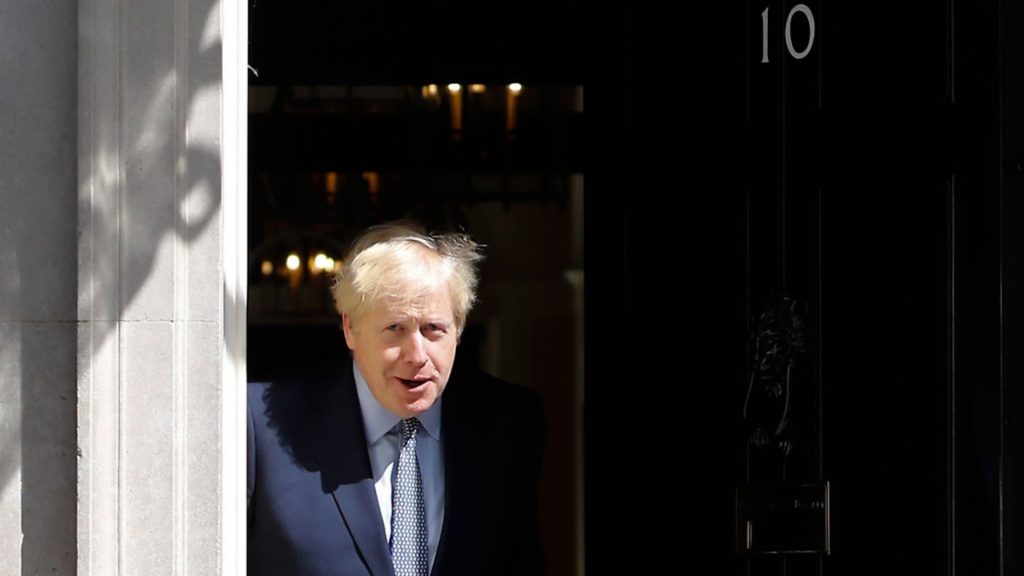
The prime minister’s undoubted gift for comedy should not be treated as trivial, says Chris Arning. We need to understand it.

Imagine you’re in a comedy club where the compere hogs the mic making the most puerile, sickening jokes, engages in cringeful puns then gradually segues into victimising remarks. But the audience is laughing along oblivious and any hecklers are taunted or mocked. And you can’t leave. Welcome to the UK, at least for the time being… It’s the BoJo Show!
Many commentators refer to Boris Johnson’s humour as if it were a trivial veneer or affectation we should not dwell on. But this is a mistake. It’s actually a mainspring of his personal power.
Not taking the PM’s humour seriously and treating it lightly means that a main source of his political aura is escaping scrutiny.
We cannot analyse Johnson without broaching class and Britishness, since he’s the epitome of upper class British values and exudes an entitlement to offend. He seeks to embody a wholesome, even nostalgic form of Britishness in his humour. He’ll play the classical scholar, the naughty schoolboy, the picaresque cad, the backbench maverick and any other role, frankly, that will get him ahead.

And he scrupulously observes the rules of British humour – the ironic detachment to earnestness, the armchair cynicism and squeamish distaste for sentimentality.
Jilly Cooper is hardly a neutral sociologist, but her 1980 book Class still nailed some truths about the British class system. She wrote that upper and working classes had more in common than intermediate ones. Johnson’s appeal is that he conspires to square this class circle. He is effectively Bingo Little and Harry Flashman meets Baldrick and the Dulux dog rolled into one.
His role in the Vote Leave campaign was a masterclass of scurrilous, subversive humour tilted at the Europhile establishment. The opposing campaign, Stronger In, was serious, earnest, technocratic – an easy target. Johnson channelled the archetype of the plain-speaking aristocrat, leavened with good old doughty Churchillian rhetoric to devastating effect – a tactic we are likely to see repeated on the election trail. But do we know how his humour really works? Research into the psychology of comedy suggests that we all unconsciously default to four styles of humour: ‘Self-enhancing’, which develops the charisma of the speaker to persuade an audience of their resilience and authority; ‘self-deprecating’, which draws attention to one’s flaws and foibles to show humanity; ‘affiliative’, which is about raising the mood through universally popular references and a common context to build broad based rapport; and ‘aggressive’, which is about exerting power through scorn, mockery and dominance.
Johnson’s style tends towards ‘self-deprecating’ and ‘affiliative’ – an interesting contrast to Donald Trump’s which is far more ‘self-enhancing’ and ‘aggressive’. Whereas the US president is a blowhard braggart, the prime minister is mostly a blagging humblebragger. His dishevelled demeanour is all part of this act. He shrewdly puts himself down, at least superficially, through acknowledging some flaws, but deflects things by his phlegmatic ironic detachment; this is part of his charisma.
What we have seen so far as PM, however, is mostly his affiliative humour style. When he urges us to “back Britain”, makes hyperbolic statements about the prowess of the UK and mocks “those who prophesise doom” he is appealing to his base, but he is also baiting and making blandishments towards his opponents, petitioning them to let go of their resentful mentality and to embrace his tenacious optimism.
But there is another side to Johnson’s humour. It is in his track record. The awful things he has said or written have been well chronicled – the “piccaninnies” with their “watermelon smiles”, Barack Obama’s “ancestral dislike” for Britain, Johnson’s casual sexism, Islamophobia, contempt for the people of Liverpool and, my favourite, his defence of Carol Thatcher for calling a black tennis player a golliwog. This is ‘aggressive humour’ – every bit as vicious as Trump’s bullying.
Johnson’s comical proclivities must be seen within a particular ideological context. What we laugh and don’t laugh at betrays our political affiliations.
Strategic humour can tacitly cement privilege or unsettle social norms. Indeed, online, humour is now a phoney war of political enmity. If we look at the polarisation of ideological blocs in the US culture wars, Black Twitter uses insider jokes to mock the ‘caucasity’ of white privilege, whilst the Alt Right use viciously abrasive memes to mock minorities and liberal ‘cucks’. In such a context, it should come as no surprise that humour becomes a discriminator.
In the UK, plain speaking – especially when it offends those deemed ‘over sensitive’ – has become a stock in trade for politicians like Johnson. No nonsense stridency will always win in Britain when it mocks the whining priggishness of (presumably hypocritical) ‘liberal elites’. The prime minister understands this well.
He also understands the ‘superiority’ theory of humour, as espoused by Freud and others, that comedy is deployed as an expression of a deep-rooted will to power, one-upmanship and a drive for dominance in a hierarchy.
Johnson grew up in a fiercely competitive, upper middle class British household and was a boarding school survivor at Eton, so he would have learned at first hand and from the best.
As AA Gill wrote in The Angry Island: Hunting the English, humour is an ingenious British strategy – whether on the football terraces, in parliamentary debate or elsewhere – for channelling anger.
But there is also the ‘relief’ school of humour, which suggests when we laugh it is to release our tension. And, God knows, there is enough of that around in the UK at the moment. Laughter increases happiness and dissolves stress. It is a drug that we cannot do without.
And herein lies the danger, there is part of many of us that wants to like this prime minister, who uses humour relentlessly to build rapport, deflect attention, parry his enemies and offer a bluff form of optimism and comical nihilism to play down the dangers of his policies.
The worst-case scenario is that over time a form of Stockholm Syndrome may develop in the UK population, where we eventually succumb to the bumbling charm of the man, and capitulate in the face of the psychological media onslaught; his ‘fibs’, his jaunty obfuscatory rhetoric and jingoistic bluster may have a seductive effect on many.
In his book Turning Back the Clock, Umberto Eco described the genius of Silvio Berlusconi for communicating to the Italian people. The politician’s gaffes only increased his ratings. Eco even accused Berlusconi of timing them to assist with his political manoeuvres or questionable activities. Johnson is in the same mould.
The best-case scenario is that the novelty quickly wears off. We acknowledge that he is a wit and raconteur, but that we do not allow that unduly to deflect our attention from his actual deeds. This is a time for sober calculations made in genuine national interest, not infantilising bluster or distracting barnstorming.









